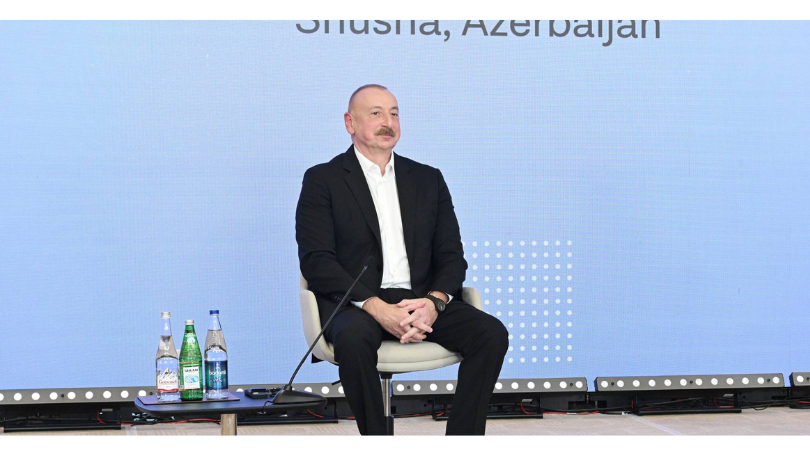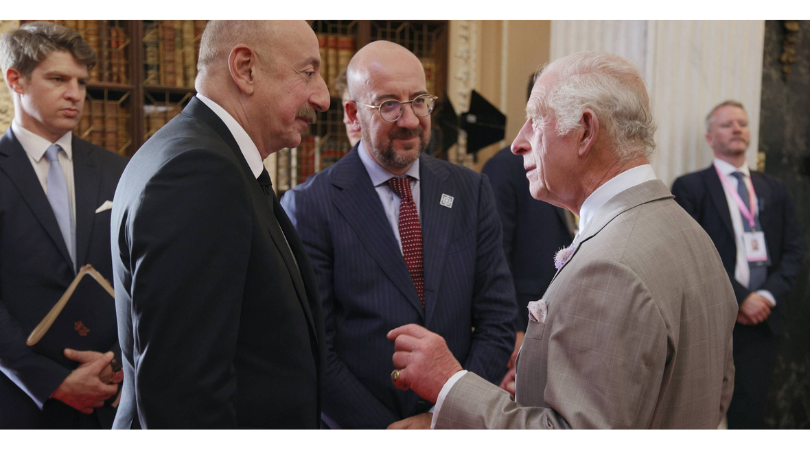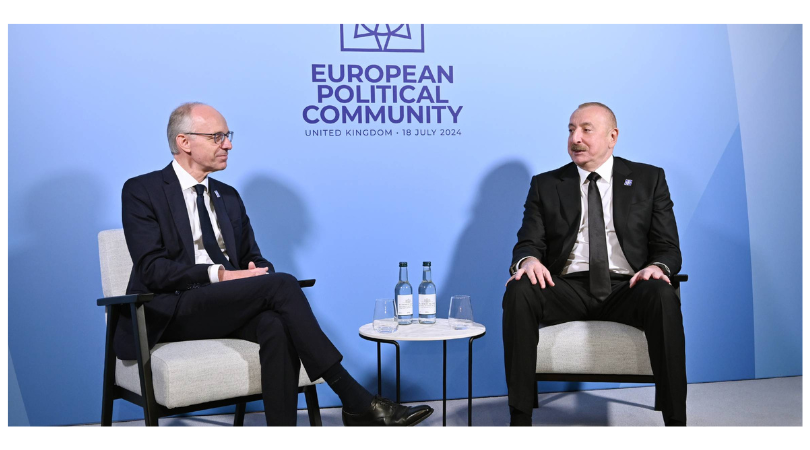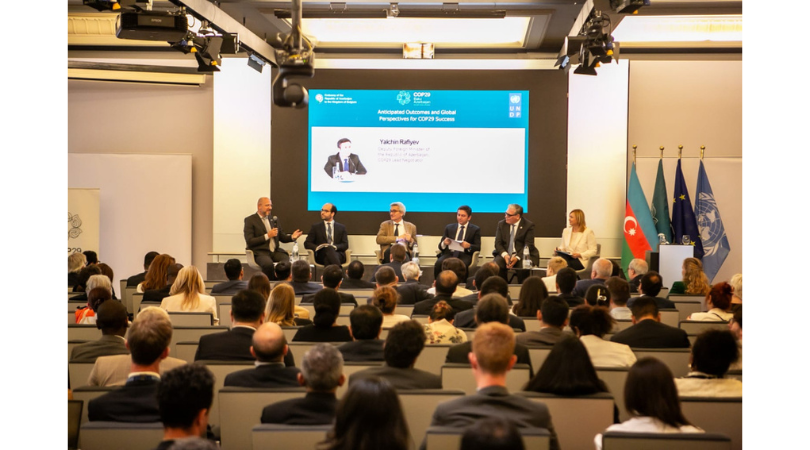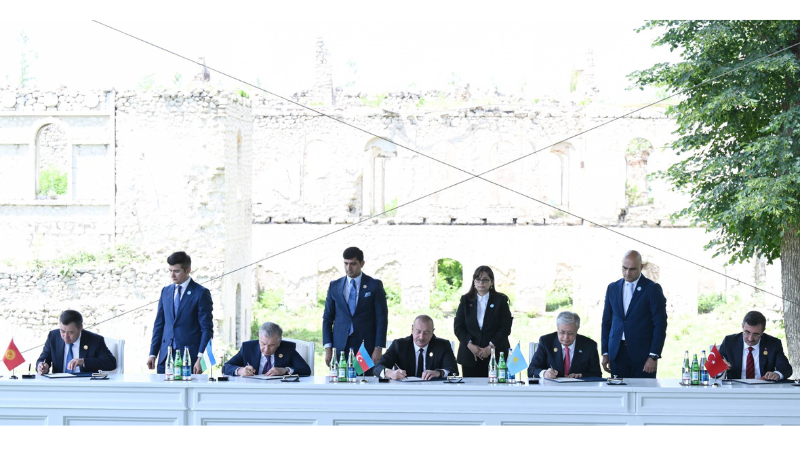BILATERAL and MULTILATERAL RELATIONS
THE REPUBLIC OF AZERBAIJAN - THE KINGDOM OF THE NETHERLANDS
On December 31, 1991 the Kingdom of The Netherlands recognized the independence of the Republic of Azerbaijan, on April 1, 1992 diplomatic relations between two countries was established.
The Embassy of the Republic of Azerbaijan was opened in The Hague in May 2007. Since September 2012 the Ambassador of the Republic of Azerbaijan to the Kingdom of the Netherlands is Mr. Mir-Hamza Efendiyev. On October 23, 2009 the Embassy of the Kingdom of the Netherlands was established in Baku. The inter-parliamentary working group between Azerbaijan and the Netherlands headed by Member of Parliament Mr. Adil Aliyev was established.
The Netherlands supports territorial integrity and sovereignty of Azerbaijan in the issue of Armenia-Azerbaijan Nagorno-Karabakh conflict. The first monument perpetuating the memory of the victims of Khojaly genocide in European Union erected in 2008 in The Hague.
Relations between two countries are growing rapidly. Either before or after the opening of diplomatic representations the following periodic high-level visits contributed to the further development of bilateral political cooperation. There were number of visits of high officials from Azerbaijan to the Netherlands and vice-versa. Visit of the Minister of Justice of the Republic of Azerbaijan, Minister of Education of the Republic of Azerbaijan, Minister of Health of the Republic of Azerbaijan, Head of the State Border Service of the Republic of Azerbaijan, Minister of Emergency Situations of the Republic of Azerbaijan, Minister of Foreign Affairs of the Republic of Azerbaijan as well as visit of the Minister of Justice of the Kingdom of the Netherlands, President of Senate of the Kingdom of the Netherlands, Minister of Infrastructure and the Environment of the Kingdom of the Netherlands, and so on.
First official visit of Azerbaijani Minister of Foreign Affairs Mr. Elmar Mammadyarov to the Netherlands took place on 10-12 June 2012 and became an important step in deepening of the bilateral political relations between the countries and covered extensive discussions on wide range of bilateral, regional and international issues.
During this visit, Mr. Mammadyarov had meeting with the Prime Minister of the Netherlands Mr. Mark Rutte, his Dutch counterpart Minister of Foreign Affairs Mr. Uri Rosenthal, vice-president of the State Council Mr. Piet Hein Donner, Ms. Nebahat Albayrak, the head of the Dutch Parliament's foreign affairs committee, and other parliamentarians and discussed the issues of mutual interest. He also met with the heads of several international organizations including Mr. Ahmet Üzümcü, Director-General of the Organization for the Prohibition of Chemical Weapons, Mr. Peter Tomka, President of the International Court of Justice.
ECONOMIC RELATIONS
The cooperation in the fields of trade, economic and investment is one of the key priorities of the bilateral relations between Azerbaijan and the Netherlands. From this point of view the visits of Dutch delegation included 15 high-level representatives of major Dutch companies, headed by the ex-Deputy Prime Minister and the Minister for Economic Affairs, Agriculture and Innovation Mr. Maxim Werhagen to Azerbaijan has significance. Within the framework of the visit Azerbaijani-Netherland business-forum has taken place on 13 September 2013.
To recognize the growing business, scientific and cultural exchanges between Azerbaijan and The Netherlands, the Embassy of Azerbaijan and Maastricht School of Management organized an “Azerbaijan Day in the Netherlands” on 24 May 2013 with a view to pioneer both international business education and trade between the two countries. The high-level event was attended by over a hundred guests, including various dignitaries, such as the Governor of the Province of Limburg, Mr. Theo Bovens, as well as ambassadors, diplomats, CEOs, managers, provincial and local government officials, academic leaders, and students. During the event an overview of the economic and investment environment in the country was presented to the audience.
At the same day there was announced the successful launch of a joint MBA program with specializations in energy and in international business between Maastricht School of Management and Azerbaijan Diplomatic Academy (ADA).
Bilateral economic cooperation is characterized by the stable dynamics of growth. The direct investments are divided according the following Dutch companies:
Damen Shipyard (dredging of Kura river),
IHC Merwede (Vessels to clean-up and environmental spills),
Van Oord Dredging and Marine Contractors – Dredging of the access channel of New Baku Sea Port project, Baku White City project development (small land reclamation and sandfill, 2nd phase of New Baku Sea Port project, Baku Caspian Shipyard extension project (together with SOCAR and Keppel), Dredging work in Caspian oil terminal Hovsan Sewage outfall, Environmental dredging Baku Bay.
Royal Haskoning DHV – 1st phase of New Baku Sea Port project, Flood protection program, Drafting and implementing a phased relocation program for the old port to the new port, Providing international expertise for port operation, Providing civil and engineering expertise in Baku city.
Witteveen&Bos – 2nd phase of New Baku Sea Port project
Deltares – Food protection, Follow up of the Food protection program
On 18-21 November 2013 he Mayor of Rotterdam Mr. Ahmed Aboutaleb organized a trade mission to Azerbaijan. The mission was supported by the Netherlands Council for Trade Promotion (NCH), the Chamber of Commerce of Rotterdam and Azerbaijan Export and Investment Promotion Foundation (AZPROMO). The mission was focused on companies and suppliers to the oil & gas, maritime and sport sectors. During the visit to Baku, Mr. Aboutaleb held several meetings with the Mayor of Baku, Mr.H.Abutalibov, Minister of Emergency, Mr.Kemaleddin Heydarov, Minister of Youth and Sports, Mr.Azad Rahimov, also with the leadership of Azerkimya, SOCAR, head of Garadagh district and other officials.
On November 18, 2013 Azerbaijani and Dutch businessmen came together in Baku for second joint Azerbaijani-Netherlands business-forum. Organized by the Ministry of Economy and Industry of Azerbaijan, AZPROMO and NCH, business forum brought together representatives of about 50 companies in industry, shipbuilding, consulting, logistics and other sectors of the two countries.
Speaking at the forum, Azerbaijan's Economic Development Ministry Administration Chief Samir Veliyev highlighted the successful development of relations between the two countries, as well as a great potential for their further strengthening. The mayor of Rotterdam expressed his satisfaction with the visit to Azerbaijan and invited Azerbaijani businessmen to an active cooperation. He also noted that Azerbaijan and the Netherlands signed a number of documents relating to enhanced cooperation. During the forum, presentations on business and investment opportunities in Azerbaijan and the Netherlands and bilateral meetings between the businessmen of the two countries were held.
According to Azerbaijan's State Customs Committee, the trade turnover between Azerbaijan and the Netherlands amounted to $149.71 million in the first eleven months of 2013. Some $143.75 million dollars out of this amount fall on imports. The export of Azerbaijani goods to the Netherlands amounted to $5.96 million dollars in this period.
Also, during his visit Mr.Aboutaleb attended the opening ceremony of Rotterdam street in Garadagh district. The ceremony was attended by head of Garadagh`s Executive Authorities Suleyman Mikayilov, Ambassador of the Netherlands Robert Jan Gabrielsen and etc. It should be mentioned that in 1952 Baku Street was established in Rotterdam. In 2011 a memorial plaque in a Rotterdam street named after Baku was officially opened.
Bilateral documents have been concluded between Azerbaijan and the Netherlands:
- Agreement between the Government of the Republic of Azerbaijan and the Government of the Kingdom of the Netherlands on air transportation (11 July 1996)
- Memorandum of Understanding between the Republic of Azerbaijan and the Kingdom of the Netherlands on cooperation program (24 April 1998)
- Agreement between the Government of the Republic of Azerbaijan and the Government of the Kingdom of the Netherlands on mutual administrative assistance for the correct application of customs legislation and customs offenses prevention, investigation and combating with them (30 January 2002)
- Memorandum of Understanding between Azerbaijan and Netherlands on the program of economic cooperation (21 February 2002)
- Memorandum of Understanding on cooperation between the Ministry of Justice of the Republic of Azerbaijan and the Ministry of Justice of the Kingdom of the Netherlands (4 February 2002)
- Agreement between the Government of the Republic of Azerbaijan and the Government of the Kingdom of the Netherlands on international road transport (25 May 2004)
- Convention between the Republic of Azerbaijan and the Kingdom of the Netherlands on avoidance of double taxation with respect to taxes on income and property and prevention of tax evasion (22 September 2008)
- Memorandum of Understanding between the State Border Service of the Republic of Azerbaijan and the Repatriation and Departure Service of the Kingdom of the Netherlands on the fight against illegal migration (1 July 2009)
- The Memorandum of Understanding between the Ministry of Internal Affairs of the Republic of Azerbaijan and the Ministry of Justice of the Kingdom of the Netherlands in the field of non-operating cooperation (10 August 2010)
OPCW-Azerbaijan
Relations between the Republic of Azerbaijan and the Organization for the Prohibition of Chemical Weapons
Azerbaijan attaches great importance to the different aspects of non-proliferation, arms control and disarmament by promoting and supporting the non-proliferation of weapons of mass destruction, with the goal of promoting international peace and security. In this regard, the importance of cooperation between Azerbaijan and the Organization for the Prohibition of Chemical Weapons is unquestionable.
The OPCW is an executive body of the Convention on the Prohibition of the development, production, stockpiling and use of Chemical Weapons and on their Destruction (CWC), signed in 1993 and entered into force in 1997. As of today the OPCW has a constituency of 190 Member States, who are working together to achieve a World free from chemical weapons. They share the collective goal of preventing chemistry from ever again being used for warfare, thereby strengthening international security.
For this purpose, the Convention contains four key provisions:
- destroying all existing chemical weapons under international verification by the OPCW;
- monitoring chemical industry to prevent new weapons from re-emerging;
- providing assistance and protection to States Parties against chemical threats; and
- fostering international cooperation to strengthen implementation of the Convention and promote the peaceful use of chemistry.
On October 11, 2013 the Norwegian Nobel Committee has decided to award the OPCW with 2013 Nobel Peace Prize for its extensive efforts to eliminate chemical weapons. The Prize was accepted by the Director-General of the OPCW Mr. Ahmet Üzümcü on December 10, 2013.
Azerbaijan joined the Convention on January 13, 1993. Convention was ratified by the Parliament of Azerbaijan on February 29, 2000. Azerbaijan is a member of the Organisation of Proheibition of Chemical Weapons since its establishment in 2000 in accordance with the Convention. On May 9, 2000 Ambassador Mir-Hamza Efendiyev was appointed as the Permanent Representative of the Republic of Azerbaijan to the OPCW.
Azerbaijan does not have chemical weapons in its territory and not any enterprises are engaged in the production of chemical weapons. The country has produced some types of organic chemicals which are declared according to the Convention. Such declarations is are submitted to relevant organizations annually.
Is worth to mention that Azerbaijani side endeavors to deepen cooperation with the Technical Secretariat of the OPCW, and try to benefit from the programs and initiatives undertaken by the Secretariat with active participation in the Eastern European Regional Group, as well as takes the relevant measures to fulfill the obligations arising from the Convention.
From 8 to 19 April 2013, the Third Special Session of the Conference of the States Parties to Review the Operation of the CWC was held in the Hague. The conference concluded with the successful adoption by consensus of a two-part final document. The political declaration confirms the commitment of the States Parties to the prohibition of chemical weapons. The second part included a comprehensive review of CWC implementation since the 2008 Review Conference and priorities in preparation for the next Review Conference. Azerbaijani side was represented in the mentioned Conference by the delegation headed by the Permanent Representative Ambassador M.Efendiyev.
25-26 April 2013 the OPCW Director-General, Ambassador Ahmet Üzümcü, visited the Republic of Azerbaijan where he had meetings with senior government officials in the Cabinet of Ministers, also in the Ministry of Foreign Affairs, Ministry of Emergency Situations, State Oil Company of Azerbaijan and the Azerkimya Production Company. The Director-General updated the officials on the global implementation of the CWC, including progress in destroying chemical weapons. Mr. A.Üzümcü commended Azerbaijan for its firm commitment to the goal of the CWC and support to the work of the OPCW.
Permanent Mission of the Republic of Azerbaijan currently collaborates with the Organization with the aim of strengthening national capacities in the field of civil defense training and qualifications for the experts. To this end, Azerbaijani side is involved in consultation with the Technical Secretariat of the OPCW and other delegations accredited to the Organization, and participates in the activities conducted by Organization on behalf of the Republic of Azerbaijan. In addition, the Mission facilitates the communication between the Technical Secretariat and other governmental bodies of the country.

